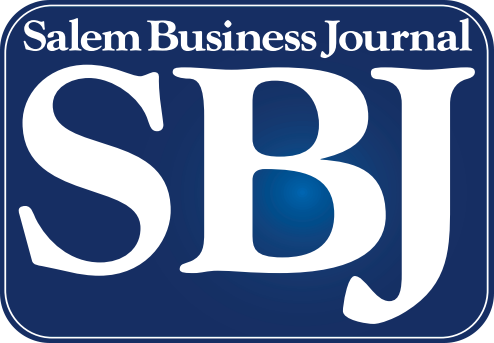Salem Chamber Candidates Questionnaire

Salem Mayoral Election
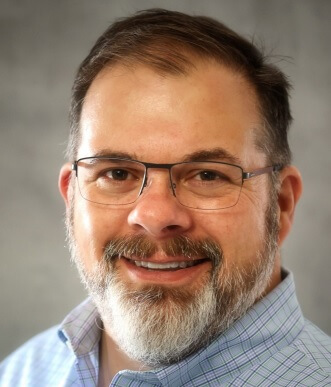
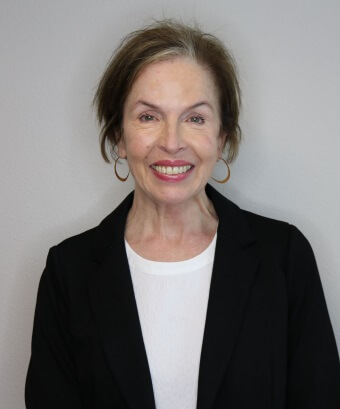
Chris Hoy, Candidate for Salem Mayor, Chane Griggs, Candidate for Salem Mayor
Question 1: We know homelessness has been identified as Salem residents’ number one issue facing our city today. What three specific actions will you take in the next six months to assist Council in improving this crisis?
Chris Hoy: 1. Ensure completion and operation of the Navigation Center.
- Establish additional locations for managed micro-shelter communities in every ward.
- Secure resources to continue and expand the Community Response Team – the team of police, housing authority, and public works personnel established to quickly and efficiently respond to unmanaged camping.
Chane Griggs: I will work with DAS to identify the underused or vacant state lands so that we can site the micro shelters – preferably not in neighborhoods or the downtown area. I will engage Marion Co and SPD to determine the feasibility of additional Mobile Crisis Response Units and Law Enforcement Assisted Diversion (LEAD) teams. I will work with legal staff (city) to identify necessary steps to enforce the sit-lie ordinance with the result of individuals’ transition into micro shelter sites and other shelter options that provide programming and treatment resources.
Question 2: The proposed city budget although with a forecasted increase in revenue of 9.8% over last year, thanks to the City Operations Fee passed in 2020 is overshadowed by the gloomy picture that city expenses are also on the rise. Due to the pandemic, the city removed the ballot measure that would have asked for an employee-paid payroll tax. While on the council, what would be your position on city revenue generation?
Chris Hoy: The tax system in Oregon is broken. Cities and counties rely on property taxes, which have been limited by voters, to fund services. If the legislature won’t fix the system (and it looks like they won’t), we will need to explore additional revenue at the city level. Areas of potential new revenue I would consider include increasing the operations fee, establishing a local income tax and other sources yet to be determined.
Chane Griggs: With a significant increase in city revenue, it is up to thoughtful leadership to determine how we best use our resources to fund essential services. In any discussion of potential additional revenue sources, the discussion needs to include strategies that don’t burden only one sector of our economic community. Rather, it should be a discussion, that includes public input, on how the city can come together to support the services it provides.
Question 3: The city has identified a “Strong and Diverse Economy” as a strategic plan item. What metrics would you desire the city measure in accomplishing this initiative?
Chris Hoy: Small business growth, new small businesses, unemployment rate, and commercial vacancy rate.
Chane Griggs: Several new businesses located in Salem; differentiate those in the core downtown area from other Salem area businesses Identify the retention rate of businesses not moving out of Salem; industrial, commercial, and retail. Identify industry sector growth or loss in the various sectors – agriculture, industrial, retail and service.
Question 4: The city has prioritized the Climate Action Plan for 2022. The plan may recommend increased city-wide regulation and fees to citizens and employers to support the initiative. What would you recommend the council does with this report?
The city should, and I believe will, look at all the recommended strategies and develop an implementation plan including the following: 1. Prioritize short-term ideas that we can do right away. 2. Develop a plan for implementing the medium-range ideas (those that can be done relatively easily, with low to moderate impact). 3. Initiate a schedule for appropriate community conversations to determine if/when other strategies should be implemented.
Chane Griggs: I would support the strategies that are incentive-based approaches rather than strategies that would negatively impact industrial entities and working-class families. For example, the ban on natural gas has numerous unintended consequences and impacts those least able to afford a higher source of energy. I need more information before weighing in on promoting any fee to citizens and employers. I would be cautious about increasing fees on any of our residents without a compelling need to do so.
Salem City Council Election
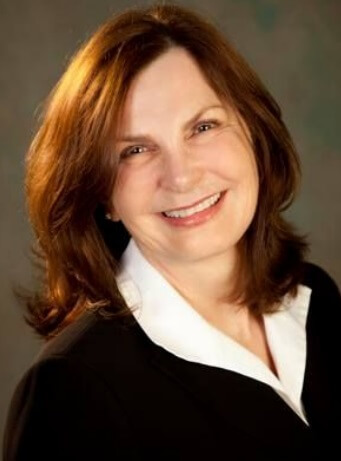
Linda Nishioka, Candidate for Salem City Council Ward 2
Question 1: We know homelessness has been identified as Salem residents’ number one issue facing our city today. What three specific actions will you take in the next six months to assist Council in improving this crisis?
Homelessness is complex because it has many facets and will not be solved using a singular solution. Negotiating pathways to try and ease and ultimately end homelessness has been and will continue to be a formidable challenge. The city has taken actions to address seriously escalating problems, such as planned sweeps of homeless camps, which some objected to. While it is easy to criticize these or other measures, we are all in a learning process trying to find solutions specific to our community. Although hindsight garners knowledge, it can be an arduous path as well. We know there will be failures as we wrestle with this colossal problem but having a collaborative, constructive mindset tempered with empathy will serve us best. It isn’t easy to define what three actions I may take in my first six months regarding homelessness. Still, I will want to focus on ways to support families, mothers, and children, from falling into homelessness. We know that housing instability is part of families’ other issues—success in school and employment, the ability to afford the basics like food, transportation, and daycare. I would also want to ensure seniors on the brick of homelessness would have access to affordable housing. Solving the housing crisis could unlock the problems of homelessness while creating a more robust economy and healthier people.
Question 2: The proposed city budget although with a forecasted increase in revenue of 9.8% over last year, thanks to the City Operations Fee passed in 2020 is overshadowed by the gloomy picture that city expenses are also on the rise. Due to the pandemic, the city removed the ballot measure that would have asked for an employee-paid payroll tax. While on the council, what would be your position on city revenue generation?
It is hard to squeeze a lemon but squeeze we must. The community is growing, but our services have not kept up. The Oregon tax limitation measures capped property tax revenue. As a result, the City’s budget has not kept pace with inflation, and property taxes are no longer enough to support existing services. Revenue is needed. What will generate this revenue will depend on the tax proposal and the voters’ understanding and acceptance. We need to improve the civic infrastructure.
Question 3: The city has identified a “Strong and Diverse Economy” as a strategic plan item. What metrics would you desire the city measure in accomplishing this initiative?
The number of new businesses located in Salem; differentiate those in the core downtown area from other Salem area businesses Identify the retention rate of businesses not moving out of Salem; industrial, commercial, and retail. Identify industry sector growth or loss in the various sectors – agriculture, industrial, retail and service.
Question 4: The city has prioritized the Climate Action Plan for 2022. The plan may recommend increased city-wide regulation and fees to citizens and employers to support the initiative. What would you recommend the council does with this report?
I would support the strategies that are incentive-based approaches rather than strategies that would negatively impact industrial entities and working-class families. For example, the ban on natural gas has numerous unintended consequences and impacts those least able to afford a higher source of energy. I need more information before weighing in on promoting any fee to citizens and employers. I would be cautious about increasing fees on any of our residents without a compelling need to do so.
Deanna Gwynn, Dynee Medlock, Candidates for Salem City Council Ward 4
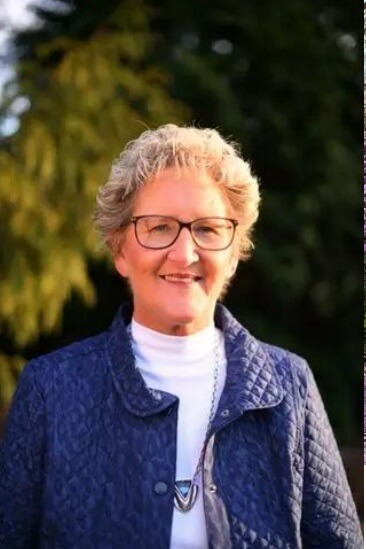

Question 1: We know homelessness has been identified as Salem residents’ number one issue facing our city today. What three specific actions will you take in the next six months to assist Council in improving this crisis?
Deanna Gwynn: I have already begun to meet with community partners to develop a better understanding of some of the projects and programs already in place. In my first six months as a city councilor, I will advocate for the navigation center. I will support a mobile response unit. Finally, I would like to see more micro shelters in place as soon as possible. Homelessness in Salem will take years to resolve. We need to work with the county, the state, and the private sector to form partnerships able to combat this crisis. I do think folks need to be accountable for their actions. They need to be willing to deal with addiction and mental health issues. We shouldn’t continue to provide resources to unhoused who choose to live on our streets, some have lived outside for 5 or 10 years. Again, I think people need to be accountable. We should show mercy. But we can’t continue to keep doing the same thing, expecting a different result.
Dynee Medlock: Did not answer
Question 2: The proposed city budget although with a forecasted increase in revenue of 9.8% over last year, thanks to the City Operations Fee passed in 2020 is overshadowed by the gloomy picture that city expenses are also on the rise. Due to the pandemic, the city removed the ballot measure that would have asked for an employee-paid payroll tax. While on the council, what would be your position on city revenue generation?
Deanna Gwynn: I would like to see city revenue increased by making it easier, not more difficult for builders and developers to provide more housing options. I don’t think raising taxes to provide more free services is the answer. I think people need to be accountable for their actions.
Dynee Medlock: Did not answer
Question 3: The city has identified a “Strong and Diverse Economy” as a strategic plan item. What metrics would you desire the city measure in accomplishing this initiative?
Deanna Gwynn: I would like to see the city measure a strong and diverse economy as having a mix of business types. The state of Oregon is currently Salem’s largest employer. I would like to see more large companies coming to our area. I’m excited to have Amazon here and want to see more businesses coming to Salem. Bringing this diversity to Salem will also strengthen our economy.
Dynee Medlock: Did not answer
Question 4: The city has prioritized the Climate Action Plan for 2022. The plan may recommend increased city-wide regulation and fees to citizens and employers to support the initiative. What would you recommend the council does with this report?
Deanna Gwynn: We need to be good stewards of our environment. There are over 180 strategies identified in the plan. Some of these can be implemented easily. Some others could dramatically impact homeowners and homeownership. We are facing a homeless crisis. I think we need to focus our efforts on getting the homeless off our streets. We need to focus on Public Safety. People don’t feel safe. We need to fix this first. As for the Climate Action Plan, I can’t think of anything worse than banning natural gas. During the ice storm in 2021, many, many people were able to stay in their homes when the power was out for close to 2 weeks because their homes are serviced by natural gas.
Dynee Medlock: Did not answer
Julie Hoy, Stacey Vieyra-Braendle, Candidates for Salem City Council Ward 6
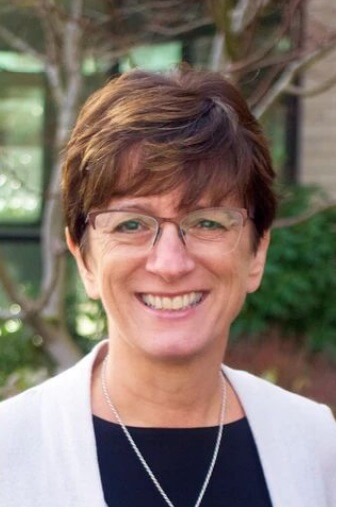
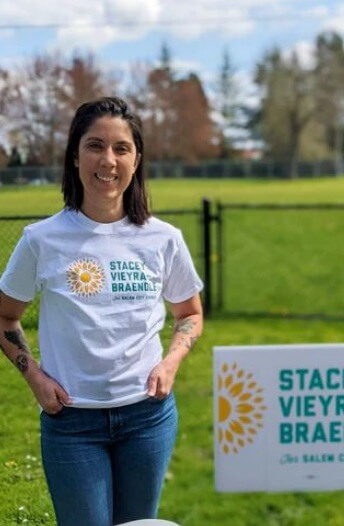
Question 1: We know homelessness has been identified as Salem residents’ number one issue facing our city today. What three specific actions will you take in the next six months to assist Council in improving this crisis?
Julie Hoy: This city is in crisis, and some Wards feel it more than others. I’m not concerned about changing a speed limit. I want decency and order returned to our neighborhoods. I want proper training and support for law enforcement. I want adequate services for the suffering. We have come to a place where it is right and it is wrong and something needs to be done about it.
Our community is incredibly generous – and I think we have a lot of people trying to solve this without necessarily a cohesive goal in mind. I think the city’s job in particular is to set a floor, for what kind of behavior we tolerate in our community, and then provide a way for those offering services and support to truly collaborate in a way that offers strategic help to those who want it, while inviting those who don’t to move elsewhere, all while enforcing the law and keeping our residents safe.
Stacey Vieyra-Braendle: It’s certainly challenging to forecast so far in advance, given how much the services and supports offered to our houseless neighbors could change. However, I think what would be imperative for me to do within my first six months is to get to know the stakeholders involved in supporting our houseless neighbors and to develop strong working relationships with them. In essence, working with them to create a SWOT analysis to assist me in conceptualizing what needs to be done, based on THEIR needs. Two specific groups to connect with are:
– Our houseless neighbors: As a healthcare professional, I strive to be client-centered in my work, and that value will carry forward into my role as city councilor as well. Thus, it’s important that I reach out to houseless neighbors, neighbors in transition, neighbors in stable housing: folks across the spectrum of houseless to housed. I need to hear from them what their needs and wants are, what the true barriers are to them in gaining and keeping housing, and to engage them in the problem-solving process. Getting to know stakeholders
– Partners in the housing market: I would like to work with them to understand the housing market as best as possible. Additionally, it would be helpful to have their perspectives on how to expand low and middle-income housing, as well as how to help families and neighbors stay housed.
Finally, an important third action will be to continue moving the Mobile Crisis Unit forward. Though this is not explicitly connected to strategies to reduce houselessness, I do believe that lack of proper mental health support is a contributing factor. It’s expensive to get caught up in our criminal and mental health systems. These exclusionary systems also reduce opportunities folks have to gain new skills to support them in successfully maintaining housing. It’s imperative that, as a city, we do everything we can to improve mental health service offerings, from trained mental health professionals to our neighbors. In my first 6 months as a counselor, I would want to get a status check on funding opportunities for the Mobile Crisis Unit, as that is a major bottleneck in getting this service started. From there, I would like to work with my fellow councilors and city staff to continue to identify funding and partner sources.
Question 2: The proposed city budget although with a forecasted increase in revenue of 9.8% over last year, thanks to the City Operations Fee passed in 2020 is overshadowed by the gloomy picture that city expenses are also on the rise. Due to the pandemic, the city removed the ballot measure that would have asked for an employee-paid payroll tax. While on the council, what would be your position on city revenue generation?
Julie Hoy: As a small business owner and longtime resident of Ward 6, I have seen a lot of fees passed over the years. I believe that people respond best to incentives. I also believe it is the city’s job to be a cheerleader for Salem. As a councilor, I will work to recruit businesses to come here, while supporting the local businesses that are already here, because it is this economic engine that will create the vibrancy we all want.
Governments are awash in cash right now because of all the federal spending. If elected, I will work to make sure that these funds are spent as strategically as possible, so they leverage our community forward, not put us on the hook for additional revenue-raising after one-time funding runs out. There are times when funding must be raised. When that is the case, I believe all the impacted parties need to be at the table to figure out the best way to raise the funds needed, and also the best way to hold the agencies collecting and spending that money accountable.
Stacey Vieyra-Braendle: I joined the Salem Budget Committee because it is imperative that I do all I can now to prepare myself to hit the ground running if elected into City Council. In my time on the committee, I have learned that our city is facing a shortfall in revenue. In addition to being able to maintain the status quo, we also need to figure out how to support the continued offering of programs we have added to help our neighbors survive the pandemic. Another piece of context around our budget that is important is that our city services are severely understaffed. If our staffing had grown at a rate to adequately support our population growth, we would have roughly 300 more staff across departments. All of this combined presents us with some difficult conversations ahead. It will also require us to take a multi-tiered approach in generating revenue, as well as require us to examine a variety of revenue-generating options.
Question 3: The city has identified a “Strong and Diverse Economy” as a strategic plan item. What metrics would you desire the city measure in accomplishing this initiative?
Julie Hoy: We need to increase our median income in Salem. If we can accomplish this, fewer of our residents will be teetering on the brink of homelessness, fewer will be looking to government agencies for assistance and more will be able to invest back into the community in helpful ways. Our city needs to show we are attractive for business investment. We can do this by investing in needed infrastructure, making sure that we have buildable lands available, and we sound like we value the business as partners.
I would want to see data on how many employers and of what size, have inquired with the city about relocating here. Why did or didn’t they decide to move here? Also, are we keeping track of businesses that leave and why? What about employment data? Are we tracking the number of jobs in Salem, and the wage? I would want to see data around sectors, and where we might actively recruit.
Stacey Vieyra-Braendle: In a recent budget committee meeting, we had a long and productive conversation regarding this strategic plan item. A large portion of that conversation was centered around what steps we are actually taking as a city to support business growth and development amongst historically neglected and disenfranchised populations (particularly BIPOC communities). It became clear that the city of Salem should be able to provide statistics on the number of businesses that are BIPOC, women, veterans, and LGBTQ+ owned. Additionally, I think we should also have available statistics on businesses owned by disabled neighbors, as well as business owners by age (as ageism has the potential to impact youth-owned businesses and businesses owned by older adults). If we are going to strive to truly diversify our businesses and business owners, we need to be able to measure that in some way.
Question 4: The city has prioritized the Climate Action Plan for 2022. The plan may recommend increased city-wide regulation and fees to citizens and employers to support the initiative. What would you recommend the council does with this report?
Julie Hoy: Climate change is real, and our response matters deeply. I believe Salem needs to create a climate action plan that is based on data and that doesn’t disproportionately impact low-income members of our community. My experience living in Ward 6 for over 30 years is that my neighbors are struggling to afford electricity and housing, while folks in other areas of the city have the luxury of championing causes that don’t actually impact their daily life.
As councilor I will work toward responsibly responding to climate issues, but not at the cost of additional burden to those already struggling to afford basic needs in our community.
Stacey Vieyra-Braendle: Salem’s climate action plan is more ambitious than Oregon’s climate action plan, which is commendable. We need an in-depth road map for accomplishing each of the goals, and they must be feasible to be doable. Regarding natural gas (methane), we must try and transition off, but it won’t be easy given its many interconnections with other areas of the climate action plan.
How do we structure a plan to replace existing methane gas-powered home appliances with electric appliances? Will there be financial support? Should it be mandated versus letting it occur by attrition? Should the focus be on reducing leakage of these appliances when off, since 75% of leakage occurs when off? Should there be a moratorium on methane gas hookup for new homes and buildings? Can renewable and non-GHG producing electric production achieve the needed power for electrification of homes and buildings? Can the electric grid system support this transition off methane gas? Should gas companies be forced to use existing technology to stop or reduce flaring, intentional venting, leakage, and loss from gas and oil drilling activities? As daunting as this all seems, we must press forward to find workable ways to answer and solve these questions.
Micki Varney, Chris Cummings, Candidates for Salem City Council Ward 8
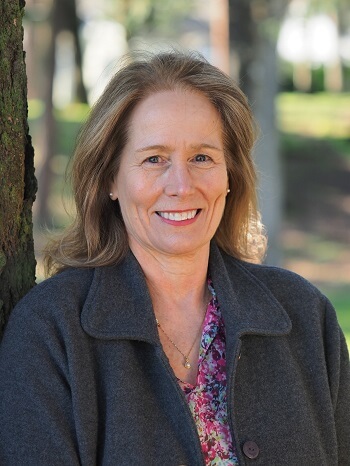
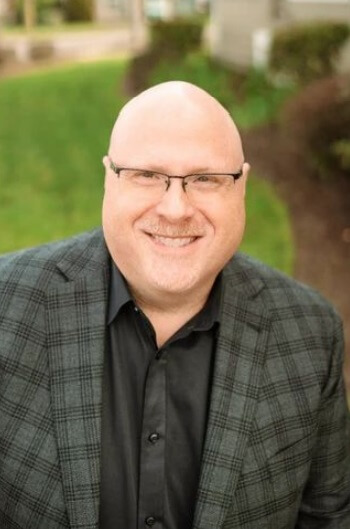
Question 1: We know homelessness has been identified as Salem residents’ number one issue facing our city today. What three specific actions will you take in the next six months to assist Council in improving this crisis?
Micki Varney:
- Conduct more community outreach so that residents have the knowledge and an understanding of the programs to address homelessness that have been implemented recently and the additional many projects the Council is working on. The more I hear from constituents, the more I realize how little they know about the services and impact the city is providing.
- As a member of the City Budget Committee, I will support balancing our need for funding for homeless services for the next 2 years with the most critical needs of our City. As usual, there is always a greater need than what we have for revenue. We were fortunate to acquire the ARPA funds we have to assist with our response. I also believe we need to keep our hand on the wheel in regards to fiscal oversight of the funds which have been secured and allocated for projects providing shelter and wrap-around and response services for FY2022 and 2023 and into 2024. Most specifically the ARPA funds: ~$7.4 million, the State Grants—navigation Center $5 million, and sheltering $5.9 million.
- We need to continue to sight areas to increase our availability of transitional housing. Salem has over 1,200 unhoused individuals needing services and shelter. The new Arches Hotel will house 100 people by the end of the year, and Church at the Park, through their successful micro-shelter community projects will soon be at capacity to serve 250 people, representing roughly 35% of people living on the street in the Salem-Keizer area. By increasing the capacity of current transitional housing sites, while still maintaining the high level of service we are providing, we can drastically reduce the number of unsheltered individuals and create a treatment and housing infrastructure that will remain in place as we continue to deal with this issue.
Chris Cummings:
- I will be digging into more preventative/proactive solutions and obtaining data from organizations that are already working on prevention programs.
- I will work to find more funding for homeless prevention programs.
- I will actively be involved in the startup of the Navigation Center and prioritize services that help folks from entering homelessness.
- I will be digging into more preventative/proactive solutions and obtaining data from organizations that are already working on prevention programs.
- I will work to find more funding for homeless prevention programs.
- I will actively be involved in the startup of the Navigation Center and prioritize services that help folks from entering homelessness.
Question 2: The proposed city budget although with a forecasted increase in revenue of 9.8% over last year, thanks to the City Operations Fee passed in 2020 is overshadowed by the gloomy picture that city expenses are also on the rise. Due to the pandemic, the city removed the ballot measure that would have asked for an employee-paid payroll tax. While on the council, what would be your position on city revenue generation?
Micki Varney: Fiscal responsibility is key at any level of government, but especially prescient within the city, where our revenue and expenditures have a direct impact on people’s lives. As City Councilor I will make sure that we consider the fiscal impact of programs and new projects, and ensure that they are responsible for the city to invest in. Furthermore, consideration of any revenue generation project for the city must also take into account the impact on our most vulnerable populations who are already financially burdened. If we were to compare ourselves to a business model, we can increase revenue by attracting and increasing the numbers of businesses and residents, by adding additional income generators, or by increasing the amount of money that each business or individual has to pay. Alternatively, a forward-thinking business can instead investigate opportunities to increase revenue by just leveraging what we have in new ways. The challenge is looking outside the box and recognizing potential opportunities. That is where my decades of experience in adaptive management and problem solving come into play. As we re-zone different areas of the city, we can increase their economic productivity. Multiple studies have shown how more traditional styles of mixed-used development are far more economically productive than modern developments. Luckily, they are also more walkable, livable, and often cheaper to build. As City Councilor I will work to encourage these sorts of developments to increase affordable housing, walkability, a supportive business environment, and a more economically productive city.
Chris Cummings: The pandemic caused more expense for everyone— employees and employers. City costs were no different. Removing the ballot measure was the right thing to do at the time. We all are facing never-before-seen expenses that no one knew how to prepare for. I will be seeking more funds from the state and federal levels to support the city’s budget shortfall. I believe that the entities creating mandates, guides, and/or rules should also be the ones funding the solutions to follow them.
Question 3: The city has identified a “Strong and Diverse Economy” as a strategic plan item. What metrics would you desire the city measure in accomplishing this initiative?
Micki Varney: I envision a Salem that is vibrant and multifaceted. That being said, the foundation of our strength and resiliency will require diversity and an understanding of required structural elements. We not only need a plan on paper, we need to periodically evaluate our progress toward that plan and be willing to adapt and modify it. One needs to be able to measure something in order to be able to manage it. Although a Strong and Diverse Economy is listed as a planned item to be accomplished, I see it as a perpetual process. Too many businesses, establishments, governments, and organizations have struggled to flourish because they refused to look at things from an outside perspective and were fixated on the credo “because we’ve always done it that way”. We need to evaluate where we are and decide if it’s truly where we envisioned, we wanted to be. • We need to be able to attract a skilled, flexible, and diverse workforce. We can measure this through the types and numbers of jobs created (metric). I feel we should advocate for training programs and apprenticeships with local businesses through Chemeketa. • We need to be able to attract and retain businesses through economic incentives and by advocating for a diversity of diversity within businesses. We can enumerate by type and size and service area.
West Salem has way too many pizza places. We need diversity in businesses to meet the communities’ diverse needs. • A diversified economy is one that can provide multiple services in multiple business sectors. This means that outside of extremely niche markets that someone can reasonably get all of their needs serviced within the city. This can be measured by determining how many people have to go outside of the city to get what they need. • We need a wide range of housing options for professionals and families and this diversity can be measured in the types and number of housing units. We need, single-family residential, multi-family, duplexes, and ADUs. Housing is needed both in residential and Urban Renewal Areas. • Transient Occupancy Tax TOT receipts are another metric we can measure to see how we are attracting business and visitors to our area (metric) • A strong economy is local. Local jobs and local companies are often more stable, a better fit for the local workforce, and more connected to the community than a transplanted or out-of-state business. This also helps to build community wealth and ensure that the money that is generated by the business is re-circulated within the local economy as opposed to taken out of it. • A strong economy is one that is resilient enough to weather a recession. That is not saying that a recession will have no impact, but that there are enough jobs and services provided that can survive and bounce back from a downturn rather than going into a spiral. • A strong economy is one that is not overly reliant on city subsidies. Subsidies can be useful to jumpstart certain industries, but they should not be relied on in the long term. We can track those as well. • A diversified economy that has businesses at multiple stages of development. Especially multiple businesses at the Stage 2 level of stable and consistent jobs that do not require an excessive amount of government subsidy. Accelerate Success in Your Place with Economic Gardening (strongtowns.org).
Chris Cummings: Measuring the number of new businesses each year by owner ethnicity and product/service category and the top-line revenue of all businesses would be good metrics to show how well the city is growing and the diverse businesses represented. Year over year growth of the number of businesses and total revenue compared to the loss of businesses and their revenue in the city would show how strong the economy is.
Question 4: The city has prioritized the Climate Action Plan for 2022. The plan may recommend increased city-wide regulation and fees to citizens and employers to support the initiative. What would you recommend the council does with this report?
Micki Varney: Salem’s Climate Action Plan (CAP) includes over 180 recommended strategies developed by a task force of 42 stakeholders from a range of sectors. Identified strategies are ranked by cost, impact on GHG reduction, timeframe for implementation, and additional benefits for our community. When the City Council adopted the Salem CAP in February 2022, they appointed a Council subcommittee to recommend strategies for early implementation. Although I have not seen the initial recommendations from the subcommittee, I believe we need to focus on the low-hanging fruit first. Actions that will be the least expensive and easiest to implement quickly while still having a measurable impact should be at the top of the list. While these may not individually have the greatest impact, the cumulative impact can decrease our greenhouse gas emissions and many of these low-level strategies benefit our community in additional ways. For example, under transportation and land use, we could restrict parking near transit stops and develop a single card and application for many of the mobility options in Salem (bus passes, ride-sharing, parking, etc.). After we get the ball rolling, we can then tackle assessment and possible implementation of additional items that will have greater impact, but, will take more time and effort to implement and will require collaboration with a range of partners within our community. I believe we also need to add the criteria of feasibility and impact on the community to the selection criteria when these strategies are reviewed. We need to assess how strategies impact those most vulnerable to economic and programmatic changes, impacts on mobility needs, and economic resilience. In the past few years, we have endured a Cyanobacteria water crisis, rampant wildfires, and an excessive heat wave that turned deadly. The question is, how long can Salem afford to wait to begin to take action? We need to start now, but unilateral action without community support, education, and input will not be as effective.
Chris Cummings: I do not support executing a climate action plan that increases fees for citizens and I would recommend the same to the council. I find the title of the report somewhat misleading. It’s not really a “Plan” to implement. But rather it’s a report of recommendations, options, and scenarios that could be implemented. While striving for a better quality of climate, I feel that citizens can choose when it’s best for them to move to more environmentally friendly products and services as they become available and economical for their families. In the meantime, the city can lead by example and implement climate-friendly products and services –their vehicle fleet, tools, contracts, etc. I do not support imposing additional fees and other financial burdens on working families as a result of a city climate action plan. I also feel that we have more important priorities to address homelessness, public safety, and affordable homes over funding a climate action plan right now.
